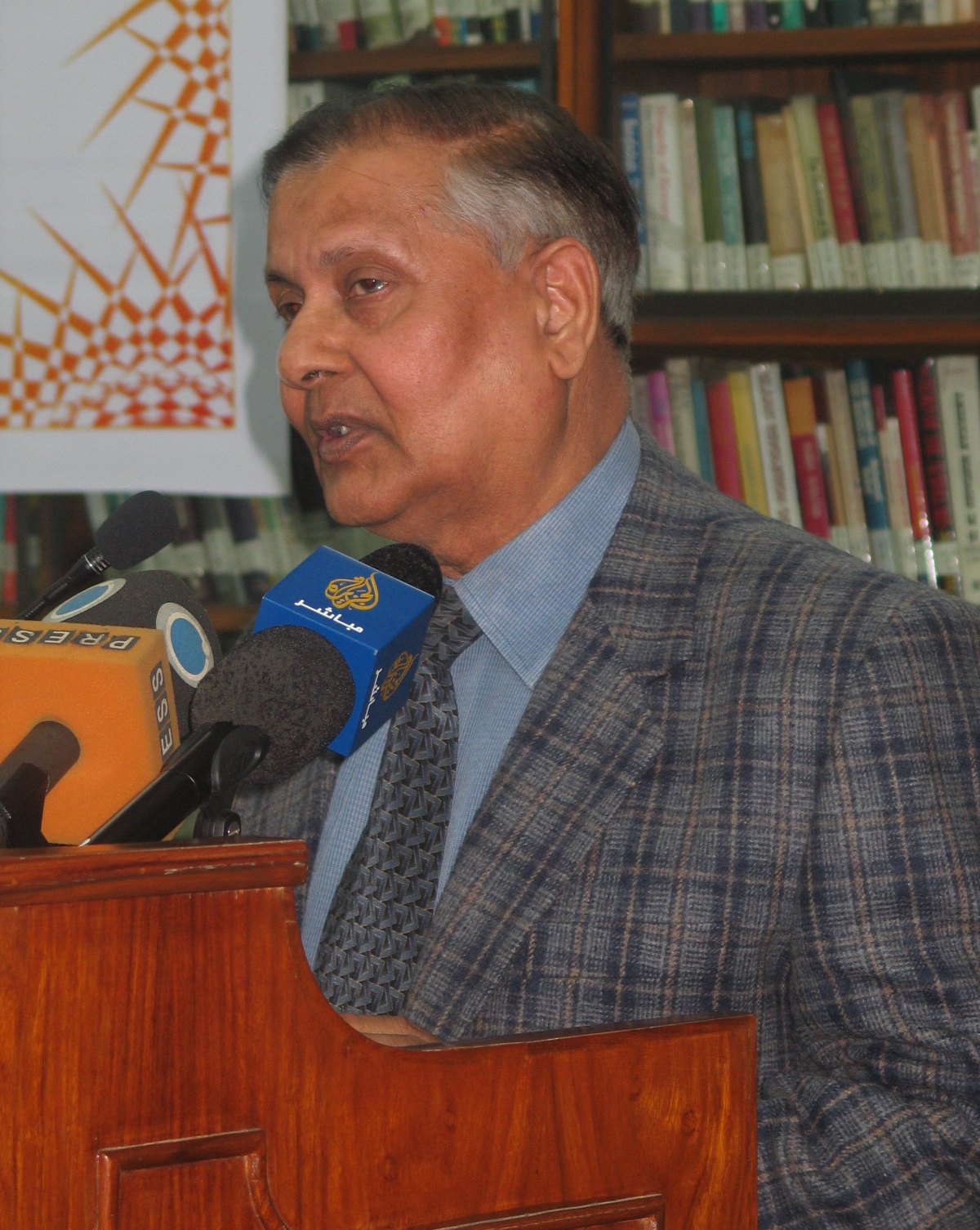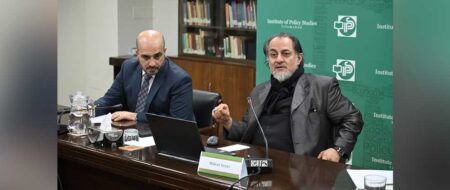Gaza aggression should not be seen in isolation: it has relevance with transition in the US and elections in Israel and Palestine. Resistance is shaping global politics. Israel has committed war crimes and crimes against humanity.
Activity: Public Seminar
Speakers: Gen (r) Mirza Aslam Baig, Chairman “FRIENDS” and former Chief of Army Staff; Tariq Fatimi, former Ambassador; Dr. Nazir Hussain, Assistant Professor of Defense and Strategic Studies in Quaid-i-Azam University, Islamabad.
Chair: Prof. Khurshid Ahmad, Chairman IPS
Gen (r) Mirza Aslam Baig; Tariq Fatimi and Dr. Nazir Hussain spoke on “Gaza Aggression; Human Cost, Objectives and Implications” in the seminar held on January 28, 2009. Professor Khurshid Ahmad, Chairman IPS, chaired the event.
Introducing the topic and the speakers, Khalid Rahman, DG IPS said that twenty two days long attacks of Israeli forces have not only left almost fifteen hundred civilians casualties, about five thousand injured and thousands homeless but it had also left behind number of complex questions about the “status of international humanitarian law, role of international community and especially of Muslim world and future of humanity on earth.” “Considering the disparity and asymmetry of Israel and HAMAS, should it really be called a war and then a ceasefire?,” he wondered. DG IPS also questioned the timing of the conflict with the transition of government in the US and forthcoming elections in Israel and Palestine.
Mr. Rahman deplored on “the shutting down of the Egyptian border over Gazans to receive humanitarian assistance” during the conflict. “HAMAS was not allowed to perform its democratic role” which pose serious questions on the seriousness behind and effectiveness in the “forward strategy of freedom and democratization in the Middle East”. Questioning the extent of destruction in Gaza, Mr. Rahman wondered, “Even if, for the sake of argument, Hamas was the real aggressor and perpetrator of this conflict, is the large scale destruction of civilian infrastructure and killings of innocent children and women justified?”
The current aggression on Gaza has provided Hamas with “further support not only in Gaza and the Muslim World but among the peace loving people in general,” thus “increasing its recognition as a key player in the Middle East,” he maintained.

Dilating upon the issue, Dr. Nazir Hussain discussed the events leading to present conflict, political and military objectives of Israel, different dimensions of human cost and implications of Israeli aggression. He reminded the audience that the “state of Israel came into existence through war, survived through war and expanded through war.”
Dr. Hussain said that Israel was the “only country in the world” that had “undemarcated boundaries” and had proclaimed objectives of further expansion. He argued that it therefore was “not the last war.” To put forth the objectives underlying Gaza aggression, he drew the attention to the earlier events in the recent past which had regretfully divided Palestine into two; “it was all designed,” he said.
“Israel had committed war crimes and crimes against humanity and the Western powers along with Muslim rulers of the region did not play the desirable role in the recent crisis,” Dr. Hussain argued.
“Gaza is one of the most densely populated regions in the world with about 1.5 million people confined in an area of 360 square kilometers” and nature of Israeli attacks which were launched after every twenty minutes on an average using “even the white phosphorous” made it clear that the intention of Israeli military and political leadership was “to kill Palestinians at a larger scale and force the rest to migrate from the area.”
He anticipated that the worst implication of this cruel operation was the elimination of all chances of peaceful coexistence in the Middle East and that the new generations would be “far more radicalized than their predecessors.”

Tariq Fatimi, who was former ambassador to Jordon and held key positions in Foreign Office of Pakistan, discussed the history of formation and legality of state of Israel in detail and maintained that “legality of very existence of the state of Israel remained dubious” according to the standards of international legal order. He wondered that United Nations was being deliberately kept away from any developments in the Middle East.
United States itself had taken the role of “prosecutor, adjudicator and jury” in the conflict, Mr. Fatimi maintained. “Europe on the other hand is being driven by a feeling of guilt”, he viewed, as it was bent upon favoring Israel to wash the stigma of anti-Jewish policies it has been pursuing in the past centuries and “it is paying Israel in the shape of shedding blood of Palestinians.”
In his key-note speech Gen Mirza Aslam Baig said that response of Muslim World and especially of Arab leadership to the issue was not up to scratch. He highlighted that during past three centuries Muslims had undergone a fall after a rise before another wave of renaissance in various regions in the world in the shape of resistance movements throughout the last century.
“These resistance movements along with US-European and Sino-Russian blocks have shaped the politics of the glob,” he maintained. Former Army Chief emphasized that Muslim resistance movements around the world were set up either for freedom from foreign occupation or for autonomy, both of which “were their legal and justified right.” He also iterated that Mujahideen in Afghanistan had come from all countries of the world to fight against the foreign occupation of Soviet Union. They did not have “any agenda of global dominance.”
Gen Baig noted with regret that even the new regime in Washington does not seem willing to change the policies of United States. “I wonder,” he said, “why the American and Western policy makers do not study and learn from history.” The whole dynamics of war had changed and on a number of occasions in the history, asymmetric conflicts like the one between Israel and Hamas “have resulted in defeat of the mightiest of the mighty,” he maintained.

Concluding the session Prof. Khurshid Ahmad said that Israeli aggression seemed to be aimed at redesigning the map of the region and “the idea of an independent Palestinian state is not on agenda” of the world powers. “They are trying to eliminate and exterminate the Palestinians,” he noted. Recent aggression of Israel against Palestinians in Gaza and related events in the Middle East should not be seen in isolation. “It has to be seen in a broader perspective” in order to develop a workable plan for peace and stability in the region.
Prof. Ahmad updated the audience that Hamas had released a video evidence of losses inflicted on Israeli forces which explains that forty-seven Israeli tanks had been destroyed while eighty Israeli troops had been killed. “Despite having no support from Arabs and Muslim world, Hamas did not lose ground and Israel could not achieve any of its declared objectives. “This fact is writing on the wall for those who feel that power can overcome the ideas,” he concluded.
The deliberations were followed by interactive question-answer session in which f and general public took part.


 Dilating upon the issue, Dr. Nazir Hussain discussed the events leading to present conflict, political and military objectives of Israel, different dimensions of human cost and implications of Israeli aggression. He reminded the audience that the “state of Israel came into existence through war, survived through war and expanded through war.”
Dilating upon the issue, Dr. Nazir Hussain discussed the events leading to present conflict, political and military objectives of Israel, different dimensions of human cost and implications of Israeli aggression. He reminded the audience that the “state of Israel came into existence through war, survived through war and expanded through war.” Tariq Fatimi, who was former ambassador to Jordon and held key positions in Foreign Office of Pakistan, discussed the history of formation and legality of state of Israel in detail and maintained that “legality of very existence of the state of Israel remained dubious” according to the standards of international legal order. He wondered that United Nations was being deliberately kept away from any developments in the Middle East.
Tariq Fatimi, who was former ambassador to Jordon and held key positions in Foreign Office of Pakistan, discussed the history of formation and legality of state of Israel in detail and maintained that “legality of very existence of the state of Israel remained dubious” according to the standards of international legal order. He wondered that United Nations was being deliberately kept away from any developments in the Middle East. Concluding the session Prof. Khurshid Ahmad said that Israeli aggression seemed to be aimed at redesigning the map of the region and “the idea of an independent Palestinian state is not on agenda” of the world powers. “They are trying to eliminate and exterminate the Palestinians,” he noted. Recent aggression of Israel against Palestinians in Gaza and related events in the Middle East should not be seen in isolation. “It has to be seen in a broader perspective” in order to develop a workable plan for peace and stability in the region.
Concluding the session Prof. Khurshid Ahmad said that Israeli aggression seemed to be aimed at redesigning the map of the region and “the idea of an independent Palestinian state is not on agenda” of the world powers. “They are trying to eliminate and exterminate the Palestinians,” he noted. Recent aggression of Israel against Palestinians in Gaza and related events in the Middle East should not be seen in isolation. “It has to be seen in a broader perspective” in order to develop a workable plan for peace and stability in the region.













